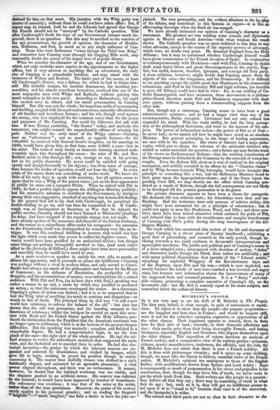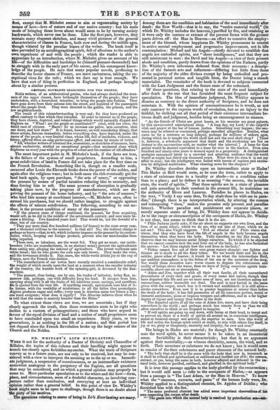MICHELET'S PEOPLE.
IT is not very easy to see the drift of M. klichelet in The People. The first part, indeed, is clear enough, in spite of enthusiasm or mysti- cism. Its object is to show that the people—the peasant proprietors— are the happiest and beat class in France ; and would be happier still, were it not for the seductive examples, rogueries, or oppressions of all the other classes. Their happiness appears to consist, first, in their love for their plot of land ; secondly, in their domestic affections and ties : their merits arise from their being thoroughly French, and hating foreigners, especially English and Germans, who impose themselves upon the other classes. This exposition of course involves an analysis of French society, and a comparative view of its various grades—peasants, citizens, master manufacturers, tradesmen, the officials, and the rich, for M. Michelet does not admit that there is now a French nobility. All this is done with picturesque vivacity; and it opens up some striking, though, we must take the liberty to believe, onesidad views of the French nation. M. Ilichelet's opinions are analogous to those of the English Sadler, with modifications drawn from Spence and Lord Ashley : there is consequently so much of prepossession in his views and prejudice in his conclusions, that, though we may have bits of truth, we never seem to get the whole truth from him. Such writers are him people in a passion : they believe all that they say ; there may be something of truth in what they do say ; but, such as it is, they will get no indifferent person to act upon it or to "stand to it," because their view is of the narrowest, and the bystander's is wider. The second and third parts are not so clear in their character as the first, except that M. kfichelet seems to aim at regenerating society by means of love—love of nature and of our native country : but his main mode of bringing these loves about would seem to be by turning society backwards, which never can be done. Like the first part, however, they contain many eloquent sketches, and many vivid pictures of the general characteristics of classes in France, both now and during the middle ages, though vitiated by the peculiar biases of the writer. The book itself ie also pervaded by an autobiographical spirit, full of allusions to the author's own experience of and with the people ; which the reader is able to appreciate by an introduction, where M. Michelet gives an account of his life—of the difficulties and hardships he (himself peasant-descended) had to straggle with in the early part of his career, and his consequent know- ledge of the people. He says that many popular novels, professing to describe the lower classes of Fiance, are mere caricatures, taking the ex- ceptional vices for the rule ; which we dare say is true enough. We have that sort of thing in perfection in England, and perhaps brought about by a similar process.
GENTEEL NOVELISTS SEARCHING FOR THE PEOPLE.
Noble writers, of an aristocratical genius, who had always sketched the man- ners of the upper classes, have bethought themselves of the people; they have undertaken, with a benevolent intention, to bring the people into fashion. They have gone down from their saloons into the street, and inquired of the passengers where the people lived. They were directed to the gallies, the prisons, and the low ne.ghbourhoods. The result of this misunderstanding is very sad; for they have produced an effect contrary to that which they intended. In order to interest us in the people, they have chosen, depicted, and related things which would naturally disgust and frighten us. "What! are the people so constituted?" cried, with one voice, the timid race of citizens. " Haste! let us increase our police, arm ourselves, shut our doors, and bolt them !" It is found, however, on well considering things, that these artists, famous dramatists, before everything else, have depicted, under the name of the people, a very limited class, whose rife, full of incidents, violence, and felony, offered them an easy picturesque effect, and success by means of terror. "All, whether writers of criminal law, economists, or sketchers of manners, have, almost exclusively, studied an exceptional people—that unclassed class which frightens us every year with the progress of crime and the number of old offenders."
The most important point in M. Michelet's book, if the facts are true, is the failure of the system of small proprietors. According to him, a great subdivision of land in France did not take place for the first time on the French Revolution. Something like it, though on a smaller scale, occurred after Louis the Eleventh broke down the power of the nobles, and again after the religious wars ; but in both cases the rich eventually got the land back again, by open purchase, "the arts of usury," or oppressing the peasant by means of partial taxation reducing him to necessity, and thus forcing him to sell. The same process of absorption is gradually taking place now, by the progress of manufactures, which are de- priving the peasant of his• home industry, and by " the arts of usurers," who lend him money at exorbitant interest,—M. Afichelet says, often to -extend his purchases, but we should rather imagine, to struggle against the effects of minute subdivision. The following, according to our au- thor, is the present condition of many of the peasantry.
"If the present state of things continued, the peasant, far from acquiring, would sell, as he did in the middle of the seventeenth century, and once more be- come a hireling. Two hundred years lost! That would be, not the downfal of a class, but of our country. " They pay more than five hundred millions (of francs) to the state every year, and a thousand millions to the usurers! Is that all? No; the indirect charge is perhaps as heavy—that, to wit, which industry imposes on the peasant by its custom- duties, which, keeping out foreign produce, prevent also our merchandise from being exported.
"Them men, so laborious are the worst fed. They get no meat; our cattle- breeders (who are manufacturers, in an abstract sense) prevent the agriculturist from eating any, alleging the interest of agriculture. The lowest workman eats white bread; but he who grows the corn eats only brown. They make the wine, and the townsman drinks it. Nay, more, the whole world drinks joy at the cup of France, save the French vine-dresser. "The manufactures of our towns have recently received a considerable relief; the weight of which recoils upon the land at a moment when the smaller industry of the country, the humble work of the spinning-girl, is devoured by the flax- machine.
•
"The peasant, thus losing, one by one, his trades of industry, today flax, to- morrow silk, perhaps, can with difficulty keep his land. It escapes from him, carrying along with it all the fruits of his laborious years, savings, and sacrifices. He is ejected from his very life. If anything remain, speculators ease him of it: • he listens, with the credulity of misfortune, to all the fables they promulgate. Algiers produces sugar and coffee; 'every man in America earns ten francs a day; one must emigrate; what does it signify? The Alsacian believes them when he is told that the ocean is scarcely broader than the Rhine."
To what extent these views are true, we are uncertain ; but if they closely approach the truth, then those economists seem to be right who incline to a custom of primogeniture ; and those who have argued in favour of the equal division of land and a nation of small proprietors seem to have concluded upon too small an experience. Sixty years, or two generations, is as nothing in the life of a nation ; and that period has not elapsed since the French Revolution broke up the large estates of the Church and the Nobles.



























 Previous page
Previous page